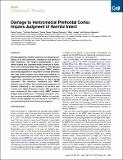Damage to Ventromedial Prefrontal Cortex Impairs Judgment of Harmful Intent
Author(s)
Young, Liane; Bechara, Antoine; Tranel, Daniel; Damasio, Hanna; Hauser, Marc; Damasio, Antonio; ... Show more Show less
DownloadYoung-2010-Damage to Ventromedi.pdf (494.4Kb)
PUBLISHER_POLICY
Publisher Policy
Article is made available in accordance with the publisher's policy and may be subject to US copyright law. Please refer to the publisher's site for terms of use.
Terms of use
Metadata
Show full item recordAbstract
Moral judgments, whether delivered in ordinary experience or in the courtroom, depend on our ability to infer intentions. We forgive unintentional or accidental harms and condemn failed attempts to harm. Prior work demonstrates that patients with damage to the ventromedial prefrontal cortex (VMPC) deliver abnormal judgments in response to moral dilemmas and that these patients are especially impaired in triggering emotional responses to inferred or abstract events (e.g., intentions), as opposed to real or actual outcomes. We therefore predicted that VMPC patients would deliver abnormal moral judgments of harmful intentions in the absence of harmful outcomes, as in failed attempts to harm. This prediction was confirmed in the current study: VMPC patients judged attempted harms, including attempted murder, as more morally permissible relative to controls. These results highlight the critical role of the VMPC in processing harmful intent for moral judgment.
Date issued
2010-03Department
Massachusetts Institute of Technology. Department of Brain and Cognitive SciencesJournal
Neuron
Publisher
Elsevier
Citation
Young, Liane, Antoine Bechara, Daniel Tranel, Hanna Damasio, Marc Hauser, and Antonio Damasio. “Damage to Ventromedial Prefrontal Cortex Impairs Judgment of Harmful Intent.” Neuron 65, no. 6 (March 2010): 845–851. © 2010 Elsevier Inc.
Version: Final published version
ISSN
08966273
1097-4199